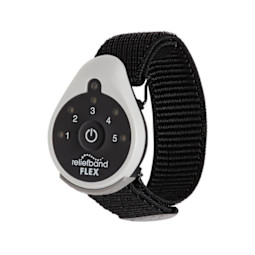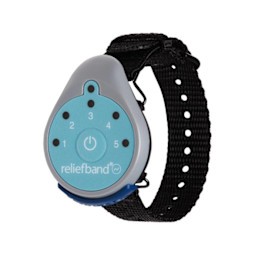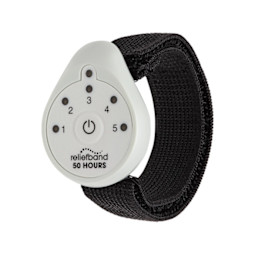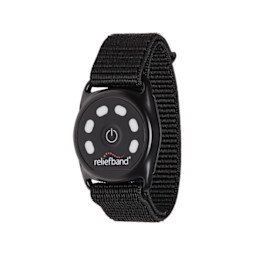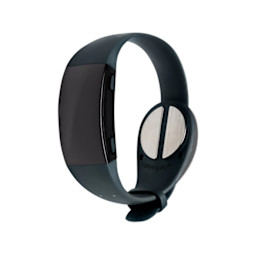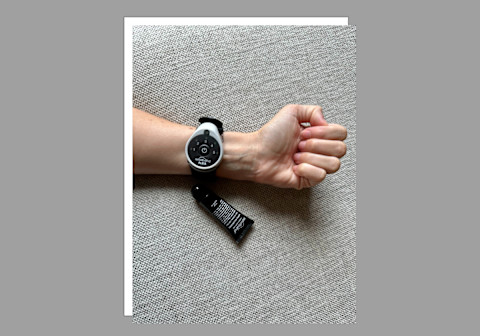
Be it on a boat, airplane, theme park ride, or the back of a speedy cab, unfortunately my ruthless motion sickness does not discriminate. So, it was music to my ears when my honeymoon aligned perfectly with the opportunity to write this Reliefband review—especially considering the trip would involve flying, driving, and a sailboat ride.
The last time I took a Dramamine I absolutely hated the fatigue it brought on, so I knew I needed to find natural nausea remedies. That's when I initially came across Reliefband, a wristband that claims to provide instant relief from nausea without any of the side effects that tend to accompany anti-nausea drugs.
I worried it was too good to be true, but I was willing to try anything to avoid hurling off the side of a beautiful catamaran. So, I decided to test the Reliefband for myself.
How does Reliefband work?
The Reliefband is a wristband that looks similar to a smartwatch. While there are a few models, the method of addressing nausea is the same: You apply a small circle of conductivity gel on the underside of one wrist (about two to three fingers' length away from your palm). Once turned on, you can choose between five intensity settings to send stimulating pulses into your wrist.
The application seemed simple, but the technology puzzled me. So, to understand how these pulses could actually help relieve nausea, I turned to the experts.
First, I wanted to understand the significance of the specific application spot on the underside of my wrist. My acupuncturist, Shobha Manaktala of Shen Men Acupuncture, explains that it's actually an acupressure point called Neiguan1, which translates to "Inner Gate" (also known as Pericardium 6 or P-6).
This point activates the median nerve, which not only helps us move our hands and wrists but carries information through our nervous system and up to our brains.
"When the device is turned on, it stimulates the median nerve, which prompts a vagal response," explains Seema Bonney, M.D., founder and director of the Anti-Aging & Longevity Center of Philadelphia. "It releases a specific pattern of pulses which claim to create a signal to a part of the brain (known as the dorsal vagal complex) that controls nausea, retching, and vomiting."
Does the Reliefband work?
"As far as whether it's legit, theoretically, vagal afferent fibers play an important role in the development of nausea and vomiting," says Bonney.
There's a bit of research to back this up, too.
- A small study from 20182 found that median nerve stimulation helped suppress scent-induced nausea in healthy men.
- Another small study from 20113 found that acustimulation (using a Reliefband) on the median nerve helped prevent driving simulation-induced nausea.
- Studies from 19994 and 20035 found that the Reliefband (in conjunction with standard anti-nausea drugs) helped relieve nausea in oncology patients.
Bonney and Manaktala both mention that acupressure (namely pressure on P-6 location where the Reliefband is placed) has been shown to help with these same symptoms.
"The point is located on the forearm, three fingers below the wrist crease between the tendons," explains Manaktala. "Pericardium 6 is a powerful point to relieve nausea and can be needled directly or stimulated through acupressure."
If electrical stimulation isn't for you, you can try applying pressure to this point using your fingers or by wearing a wristband with a bead.
Reliefband products at a glance:
Charge type:
Replaceable batteryBattery life:
350+ hoursStimulation levels:
5Waterproof:
Splash & spray proofThis is the model I have. It comes with an easily-adjustable velcro “comfort fit” band, which is perfect for people like me with tiny wrists. You can choose to swap it for a smartwatch wristband, giving you the option to wear your Samsung or Apple smartwatch on the outside of your wrist while your Reliefband device sits on the inside.
The Flex comes with a replaceable battery pre-installed. Reliefband says the battery should last around 350 hours before needing to be swapped out. Also worth noting: the Flex Reliefband is water resistant (not waterproof), so I did need to take it off when going in the ocean.
Charge type:
Replaceable batteryBattery life:
150 hoursStimulation levels:
5Waterproof:
Splash & spray proofThis is the original model of the Reliefband. It’s another battery-operated device—but, unlike the Flex, it uses a traditional buckle-style watch band that the brand says fits 4.5” to 9.5” wrists. The Classic is also splash and spray proof, but not waterproof.
One negative of the Classic is that the battery life is shorter than the Sport, Premier, and Flex models. If you plan to use your Reliefband often, it’s likely worth it to spend a few extra bucks on the Flex.
Charge type:
Non-replaceable batteryBattery life:
50 hoursStimulation levels:
5Waterproof:
Splash & spray proofThe lowest-priced Reliefband is the brand’s 50-hour model. It still includes five intensity settings and comes with a pre-installed battery that allows for (you guessed it) 50 hours of use.
Of course, you can still turn the device off when not in use by holding down the power button, so 50 hours of battery life may go a long way for some.
Worth noting: this model is excluded from Reliefband’s 14-Day money back guarantee.
Charge type:
USB rechargeableBattery life:
Up to 30 hoursStimulation levels:
6Waterproof:
WaterproofReliefband’s only waterproof model, the Sport, is a great pick for people who enjoy activities such as swimming, fishing, and surfing but struggle with motion sickness.
The wristband’s numberless design has a sleeker face than the Classic and Flex models and it comes in either black or gray. The Sport also offers six levels of intensity (versus five) and is USB rechargeable (up to 30 hours on a full charge) so you never have to worry about replacing the batteries.
Charge type:
USB rechargeableBattery life:
18 hoursStimulation levels:
10Waterproof:
Splash & spray proofIf nausea is a consistent problem for you, you’ll want to find a device that’s more discreet for everyday wear. The Reliefband Premier has a thinner profile than the other models and uses small side buttons and a digital display to show what level of stimulation you’re working with.
The Premier offers more stimulation levels and (like the Sport) is available in two colors. This is another rechargeable model, although it has a shorter battery life (18 hours) than the Sport model. It’s also the most expensive of the bunch.
Comparing the Reliefband models
| Model | Price | Charge type | Battery life | Levels | Waterproof? | 14 day trial? |
|---|---|---|---|---|---|---|
| Reliefband Flex | $180 | Battery | 350+ hours | 5 | No | Yes |
| Reliefband Classic | $150 | Battery | 150 hours | 5 | No | Yes |
| Reliefband 50 Hours | $100 | Battery | 50 hours | 5 | No | No |
| Reliefband Sport | $250 | USB rechargeable | 30 hours | 6 | Yes | Yes |
| Reliefband Premier | $280 | USB rechargeable | 18 hours | 10 | No | Yes |
My experience with the Reliefband
I brought the Reliefband Flex on my honeymoon to Portugal. I first put it on during a bout of turbulence on the plane, then for the entirety of a windy bus ride a few days later—and I experienced no nausea during either event!
The big test, however, was a three-hour dolphin-watching excursion.
Now, I can't say the Reliefband completely prevented seasickness, but I do think it helped considerably. I stuck to the center and back of the boat (any seasickness-struggler knows this is a pro move), kept my Reliefband stimulation on level one, and felt mostly OK for the first hour.
However, as soon as I took a gamble and moved to the bow of the boat, my seasickness amplified. I only lasted about 15 minutes before needing to crank my band up a few notches and return to the back. Once I was settled in the back of the boat, I was a bit wobbly for a minute, but I never actually felt like I was going to be sick (a win, as far as I'm concerned!).
Later in the day I lay down to take a nap and began to feel like I was riding the waves. I popped the Reliefband back on, and it helped me feel grounded again in a matter of minutes.
There were a few times I got lazy and used my Reliefband without the conductivity gel. It did work, but took a bit longer for me to find the sweet spot on my wrist. This in mind, I do think it works better with a bit of the gel applied.
On the con side, the Reliefband could be more attractive, and I do wish I had opted for the rechargeable model. It's also a bit of a financial investment—although the brand's 14-day money-back guarantee helps.
What does the Reliefband feel like?
When I first tried the Reliefband, I wasn't comfortable with the feeling. It's not a vibration as much as a prickling electrical sensation. If you've ever used a TENS unit, you'll notice it's a very similar experience.
I quickly grew accustomed to the pulses and even started to like the feel of it. In fact, I found myself ramping up from level one to level three when I wore the wristband for longer periods of time (there are five levels total in the model I tried).
Reliefband advises keeping the stimulation on the lowest setting, as long as you can still feel it tingling. Personally, I never made it past level three.
Reliefband pros & cons
Pros:
- No symptoms of drowsiness or fatigue
- Effects can be experienced immediately
- Most models are reusable (with charging cable or batteries)
- Adjustable bands fit most wrists
- 14-day money-back guarantee on most models
- FSA/HSA eligible
Cons:
- Some people may not like the feel of the pulses
- It's not the most aesthetically pleasing
- Several reviewers struggled with the battery compartment
- Only one model is waterproof
Who should try Reliefband?
Because it's a drug-free option, Reliefband's stimulation therapy is a relatively safe option for most people to try. Reliefband says its device is a good fit for anyone who experiences the below symptoms:
- Air & car sickness
- Seasickness
- Anxiety
- Morning sickness from pregnancy
- Motion sickness from gaming or amusement parks
- Migraine
- Nausea from chemotherapy
Who shouldn't try Reliefband?
If you're pregnant or have any underlying health conditions, it's best to consult with your doctor before trying any new treatments. Per Bonney, "If you're prone to vasovagal syncope, a condition that can lead to fainting, you should avoid this bracelet."
Other anti-nausea tools
In addition to stimulation of the median nerve (either through pulse or acupressure), Bonney says there are some other natural methods to treat nausea.
Eat ginger: "Ginger is a holistic treatment for mild nausea," explains Bonney. Research shows that ginger is a helpful aid for nausea from a variety of causes, from pregnancy6 to seasickness7.
Temporary BRAT diet: "Eating bland foods8 and crackers when feeling nauseous can also be helpful," says Bonney. Sticking to gentle foods, such as those in the BRAT diet (bananas, rice, applesauce, toast) can be easier on the tummy when you're feeling nauseated.
Just remember that a bland or BRAT diet is a short-term solution. Restricting your diet to avoid spicy or acidic foods can take a toll on your caloric intake and should not be a long-term approach to nausea.
Hum your favorite tune: While it might be a struggle to tap into your musical side when you're feeling sick, Bonney suggests that the vibration from humming can calm the stomach and suppress your gag reflexes.
FAQ:
How long does it take for Reliefband to work?
The brand says if you put the device on while you're experiencing nausea, you should feel the effects of the bracelet within 5 to 15 minutes. In my testing experience, I would say this timeline holds up!
Is Reliefband FDA approved?
"The Reliefband does have FDA clearance, which is different from FDA approval but is a critical step on the way to market," Bonney explains.
How long should you wear the Reliefband?
You can wear your Reliefband either as a preventative or as soon as symptoms arise. As soon as you feel like your symptoms have subsided, you can turn the device off.
The takeaway
While it wasn't a one-and-done cure for my seasickness, the Reliefband helped significantly. The confidence I've gained in my ability to stave off motion sickness far outweighs any small negatives. It's safe to say the Reliefband is going to be at the top of my packing list from here on out.
Meet The Experts
8 Sources
- https://pubmed.ncbi.nlm.nih.gov/30449440/
- https://www.ncbi.nlm.nih.gov/pmc/articles/PMC6348262/
- https://pubmed.ncbi.nlm.nih.gov/22338362/
- https://pubmed.ncbi.nlm.nih.gov/10452208/
- https://pubmed.ncbi.nlm.nih.gov/12836088/
- https://www.ncbi.nlm.nih.gov/pmc/articles/PMC4818021/
- https://pubmed.ncbi.nlm.nih.gov/9815340/
- https://www.ncbi.nlm.nih.gov/books/NBK538142/


